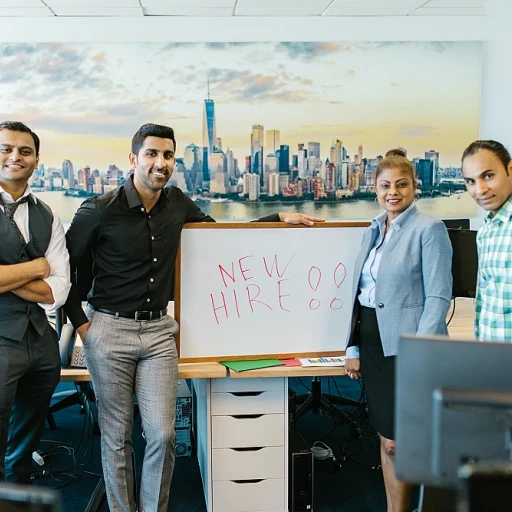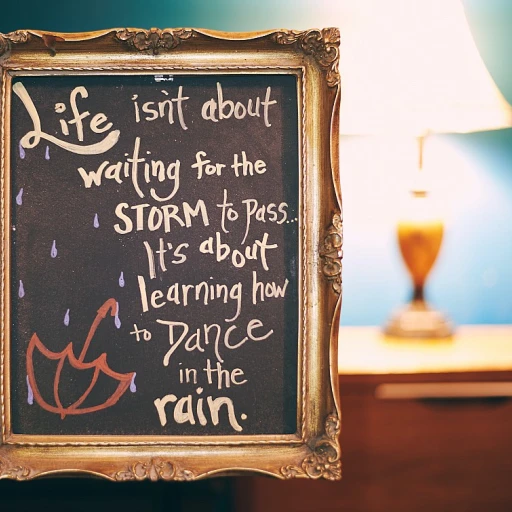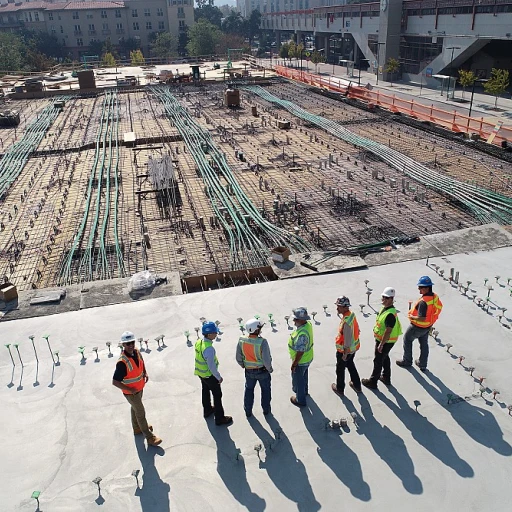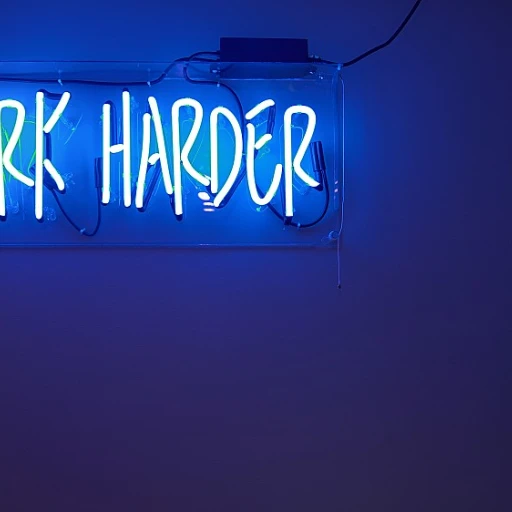
Understanding the Importance of Candidate Experience
The Significance of a Positive Candidate Experience
In today's competitive job market, the candidate experience plays a crucial role in shaping perceptions about a company. When candidates receive an interview invitation, it sets the stage for their interaction with the organization. A positive experience can enhance the company's reputation, while a negative one can deter future applications and even affect the company's brand.
For job seekers, understanding the importance of candidate experience is vital. It’s not just about securing a job offer; it’s about ensuring that every interaction, from the initial interview email to the final decision, aligns with their career goals and values. A well-handled process can leave candidates feeling respected and valued, even if they decide to decline the interview or the job offer.
Companies that prioritize candidate experience often see better engagement and retention rates. They recognize that every candidate, whether they accept or decline a position, can become an ambassador for the brand. This is why maintaining professionalism, even when declining an interview, is essential. It ensures that the door remains open for future opportunities and fosters a positive relationship with the hiring manager.
As you navigate your job search, remember that your interactions with potential employers are a two-way street. Just as companies evaluate candidates, candidates should assess whether the role and the company align with their aspirations. This mutual respect and understanding can lead to more meaningful and productive work relationships.
Reasons to Decline an Interview
Evaluating Personal Goals and Fit
Before deciding to decline a job interview, it’s crucial to assess your personal career goals and whether the role aligns with them. Every job opportunity does not necessarily mean a step forward in your professional journey. Understanding your priorities will pave the way to making informed decisions that contribute positively to your career path.
Consider the Company Culture
An often overlooked aspect when evaluating an interview offer is the company's culture. Take time to research and understand the ethos of the company. Ask yourself if you envision working there long term and if their values align with yours. A mismatch between the job and your own professional ethos is a valid reason to decline.
Location and Commute Time
Geographical constraints and commute time can have a significant impact on your work-life balance. If the role requires relocating or involves a lengthy commute that you’re unwilling to undertake, it becomes a legitimate reason to politely decline the interview. Weigh these factors carefully to make the best decision for your lifestyle.
Compensation and Benefits
While compensation isn’t the only factor in a job decision, it's essential to consider if the position’s salary and benefits meet your expectations and current needs. If the compensation package falls short, declining the interview might be the right path, allowing you to pursue opportunities better aligned with your financial goals.
Evaluating Job Role and Responsibilities
Understanding the job title’s responsibilities is fundamental before committing to an interview. If the job duties do not excite you or do not provide opportunities for growth and skill enhancement, this might be a clear sign to let it go. For more insights on how interview delays might affect your evaluation, you can read about the impact of interview timing.
Crafting a Polite Decline Message
Composing a Respectful Message to Decline
Crafting an effective message to politely decline an interview requires tact and consideration. Your message should honor the time the hiring manager and the company have dedicated to reviewing your application and presenting the job opportunity. Here are a few steps to keep in mind when drafting your response:- Be Prompt: As addressed earlier, timing is crucial. Sending your decline email at the earliest possible moment after you've decided isn't just respectful; it's professional. This allows the recruiter or hiring manager to adjust their schedule or extend the interview offer to another candidate.
- Express Gratitude: Always begin with appreciation. Acknowledge the efforts of the company and the opportunity they provided. For example, "I appreciate the time you have taken to consider my application for the [Job Title] position."
- State Your Declination Clearly Yet Tactfully: It's important to be clear about your decision to decline while ensuring your tone remains polite and appreciative. A simple statement like, "After careful consideration, I have decided to pursue a different path," is direct yet respectful.
- Provide a Brief Reason: While detailed explanations aren't necessary, giving a succinct reason can be polite. You might mention career goals, a change in circumstances, or another job offer. For instance, "I have accepted another offer that aligns more closely with my career aspirations."
- Leave the Door Open for Future Opportunities: It's wise to express interest in maintaining a positive relationship. This could be valuable for future job searches or networking opportunities. Consider saying, "I would welcome the opportunity to stay in touch for future roles within your company."
Timing Your Response
Determining the Right Moment to Send Your Response
Responding to an interview invitation can be a complex decision, especially when you’ve decided to decline the offer. Timing plays a significant role in maintaining professionalism and preserving a positive relationship with the company. Let's explore the best practices for when to communicate your decision. Making sure that you reply promptly once you’ve decided to decline the interview is crucial. Here are a few points to consider:- Express Gratitude for the Opportunity: Acknowledge that the company has considered you for the role and express appreciation for their time and effort. Mentioning the job title and highlighting the positive aspects of the company can help convey your interest even as you step back from the process.
- Consider the Hiring Timeline: Every interview and hiring process has a schedule. If the interview was to take place soon or if you’ve received the interview email recently, try to respond as promptly as possible. This not only shows respect for the hiring manager’s time but also allows them to proceed with finding another suitable candidate.
- Balancing Your Decision and Future Opportunities: While it’s important to be swift in responding, ensure you’ve fully considered your reasons for declining. Hastily declining without thorough consideration could close doors to future opportunities with the company.
- Business Hours Matter: Sending your email during standard business hours shows respect and professionalism. A well-timed email is more likely to be noticed and appreciated.
Maintaining Relationships with Employers
Fostering Positive Connections with Employers
When one decides to decline a job offer or an interview, it might seem like the end of the road in terms of that opportunity. However, maintaining a good rapport with potential employers is possible, and it can keep the door open for future opportunities. Here’s how you can preserve and nurture these professional relationships:- Express Gratitude: In your email or conversation declining the interview, ensure to convey your appreciation for the time and effort the hiring manager put into considering you for the role. This goes a long way in showing respect and professionalism.
- Offer Genuine Reasons: Though you should have valid reasons to decline an interview, offering a brief but sincere explanation helps in maintaining transparency. It highlights that you have thoroughly thought about your career goals and the current job doesn't fit them.
- Keep Lines of Communication Open: Mention your interest in staying connected for potential future roles that might suit your interests better. By leaving the door open, you emphasize a professional interest that may turn into an opportunity down the line.
- Network Professionally: Engaging with the company on platforms like LinkedIn by following updates or engaging with their content can subtly reinforce your continued interest in their work.
- Reaffirm Interest in the Company: During your correspondence, you might want to reiterate your appreciation of the company’s mission or projects, indicating your admiration for their work.
Common Mistakes to Avoid
Avoiding Pitfalls When Saying No
When deciding to politely decline an interview invitation, there are common mistakes one should avoid to maintain professionalism and leave the door open for future opportunities. Understanding these pitfalls can make the process smoother and uphold a positive candidate experience.
- Procrastinating Your Response: Time is of the essence when it comes to responding to job offers or interview invitations. Hesitating to decline an interview can frustrate the hiring manager and waste their valuable time. It's best to communicate your decision promptly once you've made it.
- Vague Reasons for Declining: While you don’t have to go into great detail, providing a clear reason for declining the offer or interview position can foster respect and understanding. It could relate to a mismatch in job title or career goals, or perhaps another offering aligns better with your current situation.
- Burning Bridges: The importance of maintaining good relationships with potential employers cannot be overstressed. Being verbose or unprofessional in your decline email can harm your professional image. Instead, express appreciation for the opportunity and highlight your availability for opportunities in the future.
- Ignoring Offered Details: Pay attention to every detail mentioned in the interview job email. Overlooking aspects of the job description can lead to miscommunication, which doesn’t reflect the best on you as a professional candidate.
- Being Unfocused on Future Goals: While being honest about why you're declining the position, remember your career goals. Ensure that your decline aligns with these objectives, and communicate how they inform your decision in a tactful manner.
A smooth, respectful decline can significantly enhance your professional image and could potentially lead to future job opportunities. It’s important to stay aligned with your values and career path while being respectful of the opportunity the company has extended to you.













